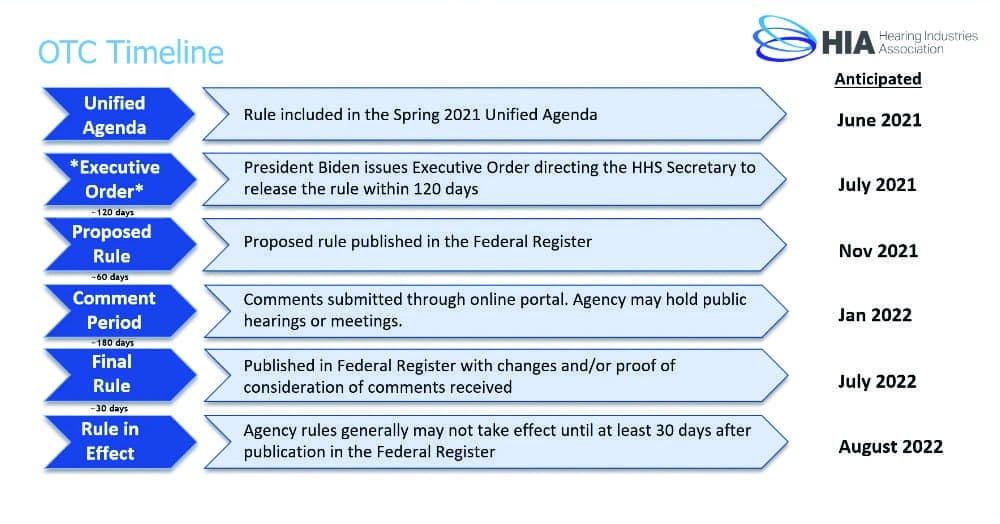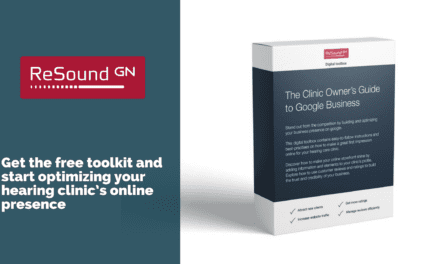Practice Management | October 2021 Hearing Review
By Joe Lugara
The introduction of OTC hearing aids doesn’t have to be something you dread. You can use it as an opportunity to revolutionize your practice and make changes that work in both your and the consumers’ favor.
In August 2017, President Trump signed the Over the Counter (OTC) Hearing Aid Act, which had been passed by Congress and authorized direct sales of hearing aids without a medical referral or prescription.1 A Notice of Proposed Rule Making (NPRM) was issued by the FDA, which was to be followed by an open comment period, then the final rules. The Act gave the FDA a deadline of August 18, 2020 to publish proposed regulations for the new category—so there has been a significant delay due to the Covid-19 pandemic.
Senators Elizabeth Warren (D-Mass) and Chuck Grassley (R-Iowa) issued a press release in November 2020 urging the FDA to initiate its rules “without further delay,”2 and on July 9, 2021, President Biden unveiled an executive order of 72 initiatives that included, among other things, plans to allow hearing aids to be sold over the counter at pharmacies.3 However, because of the required steps and comment period required for medical devices, it is thought that finalized rules for the OTC hearing aid classification may stretch well into the third quarter of 2022.
As noted by the FDA, there currently is no such thing as an OTC aid.4 However, it is widely thought the Agency will issue its proposed OTC rule for comment very soon. As pointed out in Hearing Review,5 the Office of Management and Budget (OMB) published its Spring 2021 Unified Agenda that included OTC hearing aids. According to the Hearing Industries Association (HIA), once the proposed OTC rules are issued, there is likely to be a 60-day comment period, followed by a 180-day period during which FDA reviews those comments, makes changes, writes a preamble, and obtains the necessary sign-offs (Figure 1). Final rules are published in the Federal Register, and generally take effect 30 days after publication. That means, barring an accelerated timeline, it will be at least another 9-12 months before the final rules go into effect, pushing OTC into Summer 2022.

In addition to what the FDA’s proposed rules will entail and how much they will resemble or deviate from the August 2018 OTC Hearing Aid Consensus Statement by AAA, ADA, ASHA, and IHS,6 there are many unknowns, including:
- The complexity of the issues surrounding the new market,
- How the federal law will affect individual state licensing requirements, receipt requirements, return periods, and advertising and promotions,7 and
- How competition from unregulated suppliers might affect business.
After the final rules are set and everything is approved, OTC hearing aids are going to begin rolling out. Some companies have already begun working on products behind the scenes in anticipation of this new market.
Related article: Maintaining Consumer Protections for All Hearing Aids, by Bridget Dobyan and Sara W. Koblitz, Esq
Hearing care professionals (HCPs) are still speculating about how OTC hearing devices could impact the world of hearing care and hearing aids. But there is one thing everyone can agree on: you need to be prepared for them. And, as shown above, there is still time.
Addressing Concerns with OTC Hearing Aids
OTC hearing aids are an interesting opportunity because while more people buying hearing aids is a good thing for your bottom line, it may not be the best thing for the consumer. Someone who just picks a hearing aid is missing crucial steps in the process like:
Including an HCP who can perform assessment of the condition and health of their auditory system via otoscopy, bone-conduction, and tests not typically included for online devices.
A comprehensive hearing assessment to determine whether someone has an identifiable hearing loss or an auditory processing disorder, and whether the hearing loss is temporary or permanent.
Reviewing medical history, including medication information, which can contribute to hearing loss.
Even if hearing aids will be easier to get, people still need to become educated consumers to learn all they can about the hearing aids before they make the purchase. Consumers may think “I can do this all myself; I can pick a hearing aid and program it” only to find later it doesn’t work for them. In many of these cases, too many crucial steps will be skipped in the fitting process to find the appropriate hearing aid for them—a key reason for a traditional audiological evalation and needs assessment.
Once OTC hearing aids are a reality, companies will be able to produce an OTC hearing device designed to address mild-to-moderate hearing losses. As an HCP, you may be concerned this leaves out important treatment areas that are covered in professional care, not only from a health perspective, but also regarding the counseling and rehabilitation necessary when it comes to acclimatization of hearing aids. Without the comprehensive care that is delivered in practice, it could be that patients try hearing aids and then think amplification is not helpful.
Alternatively, this could be a great way to get more people wearing hearing aids, then potentially seeking your help. Tran and Manchaiah8 conducted a review of several papers on DTC hearing devices and concluded that the literature suggests positive outcomes for these devices in older adults with hearing loss. However, they were also careful to note that the studies had a low quality of evidence, looked at the participants over a short period of time, and may have been influenced by the researchers’ involvement in the companies/devices.
The Race is Already On
Whatever the case, OTC hearing aids are coming soon. And it is just a matter of time before big tech companies jump on the OTC hearing aid bandwagon. Some businesses are already falsely claiming to sell OTC hearing aids (even though the FDA has issued warning letters to these companies9).
OTC hearing aids are seen by many as a huge opportunity, and there may be a Google hearing aid on the market soon. Alphabet, Google’s parent company, is currently working on Project Wolverine which is exploring the future of hearing through sensor-packed hardware. Other notable companies and devices in this area include Bose SoundControl Hearing Aids, Apple’s new beamforming and “Conversation Boost” features in its AirPod Pro, NuHeara IQbuds2 Max, Lucid Hearing Aids, and the Olive Union Pro 2-in-1. In June, Jacoti launched OTC Ready, which is designed to enable headphones and earbuds with the popular Qualcomm 5100 chip to offer features similar to an OTC hearing device.
Related article: Earphone Models for iPhones: Surprising Results When Used with a Hearing App, by Larry Medwetsky, PhD, Katie Kelly, AuD, and Matthew Bakke, PhD
Lexie Lumen hearing aids are now available directly for sale in hundreds of Walgreens stores in Arizona, Colorado, North Carolina, Tennessee, and Texas. These devices feature directional hearing, adaptive noise reduction, autofit technology (through an algorithm that customizes devices to a specific hearing profile), and telecoils. The hearing aids are available for purchase in-store, as well as on walgreens.com and Walgreens Find Care.
These new OTC devices aren’t necessarily going to threaten the current position of hearing aid manufacturers that have been around for decades. In fact, you’re already seeing some manufacturers introducing their own OTC hearing aid solutions designed to help HCPs compete in this market.
Some Considerations to Get You Prepared
OTC hearing aids can be a huge opportunity for your practice if you are ready when they are available. You can incorporate OTC hearing aids into your website, within your practice, and/or your in-person patient interactions. More devices mean more versatile treatment options for a wider range of patients.
If you have a service-led patient-centered approach, your practice can grow and thrive with OTC hearing aids. Some important questions to ask yourself are:
- Am I prepared to partner with any hearing aid manufacturers or new companies that will offer OTC hearing aids?
- Is my practice equipped to stock and sell OTC hearing aids?
- Do we have e-commerce on our website that would support an OTC device?
- Do we have a section on our website that offers information or addresses questions about OTC hearing aids?
- Can I unbundle my services to offer more treatment versatility to all patients?
E-commerce may sound like a complicated thing. In truth, it can be, but it doesn’t have to be! Selling hearing aids online, along with other hearing-related supplies, can be a game-changer for the success of your practice. Consumers (and patients) expect easy access, so if they need supplies, they’d like to easily get them from someone they trust: a professional.
Conclusion
Many believe that OTC hearing aids will open the door to consumers who currently are not wearing hearing aids, and ultimately provide greater accessibility and affordability for hearing care. While it remains to be seen, it is also hoped they will become a gateway device that demonstrates the value of amplification then leads them to seek professionally driven hearing care solutions.
OTC hearing aids don’t have to be something you dread. You can take this as an opportunity to revolutionize your practice and make changes that work in your favor. HCPs do more than sell hearing aids, and OTC hearing aids can deliver a unique opportunity to bring even more patients into your practice.
References
- President Trump signs OTC hearing aid legislation into law. Hearing Review. https://www.hearingreview. com/inside-hearing/legislation/president-trump-signs-otc-hearing-aid-legislation-law. Published. August 19, 2017.
- Senators Warren and Grassley urge FDA to initiate ‘overdue rules’ for ‘OTC Hearing Aid Act’. Hearing Review. https://hearingreview.com/inside-hearing/legislation/senators-warren-and-grassley-urge-fda-to-initiate-overdue-rules-for-otc-hearing-aid-act. Published Nov 16, 2020.
- Smriga D. A comment on Biden’s recent Executive Order regarding hearing care. Hearing Review. https://hearingreview.com/inside-hearing/legislation/hearing-11. Published July 14, 2021.
- US Food and Drug Administration (FDA) website. Hearing aids. https://www.fda.gov/medical-devices/consumer-products/hearing-aids. Published July 24, 2018.
- Biden Executive Order looks at cost of hearing aids. Hearing Review. https://hearingreview.com/inside-hearing/legislation/biden. Published July 9, 2021.
- OTC Hearing Aid Consensus Statement published by AAA, ADA, IHS, and ASHA. Hearing Review. https://www. hearingreview.com/hearing-products/hearing-aids/ite/otc-hearing-aid-consensus-statement-published-aaa-ada-ihs-asha. Published August 14, 2018.
- Dobyan B, Koblitz SW. Maintaining consumer protections for all hearing aids. Hearing Review. http://www. hearingreview.com/inside-hearing/regulation/consumer-protections-for-all-hearing-aids. Published August 18, 2020.
- Tran NR, Manchaiah V. Outcomes of direct-to-consumer hearing devices for people with hearing loss: A review. J Audiol Otol. 2018;22(4):178-188.
- US Food and Drug Administration (FDA) website. Letter to hearing aid manufacturers. https://www. fda.gov/media/114844/download. Published July 24, 2018.
Correspondence to Joe Lugara at: [email protected].
About the author: Joe Lugara is the CEO and Founder of Audiology Plus, a company designed to expand online reach and attract more patients, generate new revenue, and enhance scale in today’s new world. A digital expert with over 20+ years of marketing and hearing healthcare experience, Lugara was born into the hearing industry and now seeks to help propel it into the modern age by empowering practice owners to accept technology rather than fight it.
Citation for this article: Lugara J. Preparing Your Hearing Care Practice for OTC Hearing Aids. Hearing Review. 2021;28(10):28-29.






